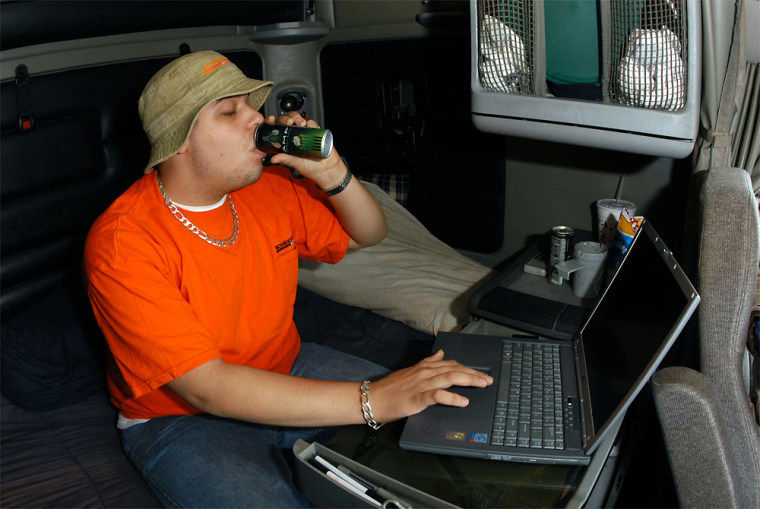All across the concrete byways of this interstate nation, long-haul truckers are going the extra miles -- but it isn't necessarily for heaping plates of hearty fare or hot showers.
It's Wi-Fi they're wanting.
David Maloney, a trucker from Aledo, Texas, is one who'll go the distance to reach a truck stop equipped with wireless Internet access.
"The only time I really get to use any kind of broadband is out here on the road," said Maloney, who recently stopped at a Flying J with Wi-Fi on his way from Virginia to Appleton, Wis. "That's the whole reason I came this far last night."
Wireless Internet is fast becoming as vital a communications tool for drivers as CB radio, truckers say, giving them a way to stay in closer touch with home and to entertain themselves.
Wi-Fi, short for Wireless Fidelity, lets computers users within a few hundred feet share a high-speed Internet connection. Since being introduced in the late 1990s, the technology has caught on in coffee shops, college campuses and corporate America.
Industry analysts say there are now about 695,000 wireless networks operating in the United States, with roughly $1.7 billion spent on Wi-Fi equipment in 2003.
"Truckers have always been wireless pioneers -- remember CB radio," said Allan Meiusi, vice president and chief operating officer of Truckstop.net, which sells Wi-Fi access to 351 travel plazas and truck stops around the country. Plans call for Truckstop.net to have 3,000 Wi-Fi "hot spots" for truckers in two years.
Truck stops picked up on the technology about a year ago, said David McClure, director of marketing for Petro Truck Stops, which offers Wi-Fi service at its 60 stores through Truckstop.net.
With about 70 percent of truckers owning computers and nearly two-thirds having Internet access at home, creating a way for truckers to get online while on the road seemed like a no-brainer, Meiusi said.
To make wireless Internet work, truck stops install antennas that serve as "access points" on building roofs. All truckers need is Wi-Fi-capable computers. Inside the truck stops are kiosks where online access can be purchased by the hour, day, week, month or year. After they pay, the drivers are given a password to get online.
Flying J, which offers its own Wi-Fi service at 180 locations around the country and Canada, sells access for $1.95 for an hour online to $200 for a yearlong subscription. New Plymouth, Idaho-based Truckstop.net charges $250 a year for access at its locations.
Truck drivers like the convenience of Wi-Fi, said Phil Briggs, assistant general manager of the Flying J Travel Plaza in Waddy, 40 miles east of Louisville along Interstate 64.
Inside cramped sleeping quarters in the cab of a truck, Maloney pulls out a tray, places his laptop on it and within seconds is online, chatting with friends as he kills time before resuming his trip.
Tom Wiles, a trucker from Westfork, Ark., checks his bank account, e-mails family and friends and updates his Web page, which features a Web log and photos of everything from plants to snow-covered landscapes to his own tattoos. It also allows Wiles to make some extra money _ the photos he takes all around the country can be purchased through the Web site for a quarter apiece.
Wireless, Wiles said, simplifies his life. It lets him drive a truck instead of being tied to one place in an office job, and gives him an outlet after many hours alone on the road.
"It's a great way to meet people online as well as being able to voice opinions," Wiles said.
C.K. Geddie of Brookfield, Mo., is eager to be able to log on to a wireless network. Like many drivers, Geddie has a laptop in her truck, but hasn't had the chance to upgrade the computer to handle wireless Internet.
"It's on my list next time I'm home," Geddie said.
